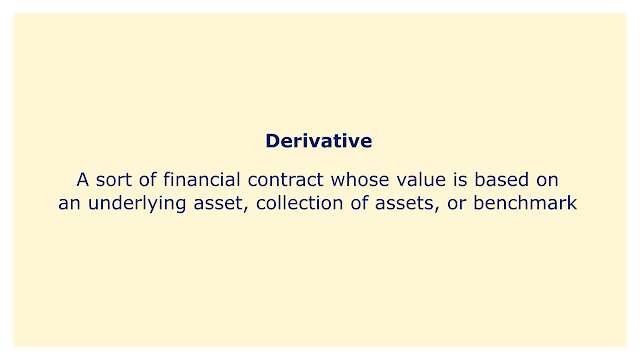 |
| Image: Moneybestpal.com |
A derivative is a sort of financial contract whose value is based on an underlying asset, collection of assets, or benchmark. A derivative is agreed upon by two or more parties who can trade over-the-counter (OTC) or on an exchange. These contracts can be used to trade various assets and gain access to particular marketplaces.
Derivatives come in a variety of forms, such as:
- Futures: contracts that obligate the buyer to buy an asset or the seller to sell an asset at a fixed price and future date.
- Options: agreements that grant the buyer the right, but not the duty, to purchase or sell an asset at a particular price before or on a specific date.
- Swaps: agreements in which two parties trade cash flows or other variables based on an underlying asset.
- Forwards: bespoke, over-the-counter contracts that resemble futures but are not as liquid.
- Warrants: agreements that grant the holder the right but not the obligation to purchase a specific number of shares at a specified price within a predetermined time frame
Derivatives can have various purposes, such as:
- Hedging: minimizing the risk of unfavorable changes in an asset's price through the use of derivatives
- Speculating: placing bets on the course of an asset's price using derivatives
- Arbitrage: taking advantage of price disparities between two or more markets by employing derivatives.
- Leveraging: increasing exposure to an asset with less money by employing derivatives
Depending on their use and regulation, derivatives can potentially have a variety of benefits and drawbacks. Some possible pros and cons are:
Pros:
Pros:
- For investors and traders, derivatives can offer flexibility and variety.
- The use of derivatives can improve profits and assist control of risk.
- Derivatives can increase market liquidity and efficiency.
Cons:
- It may be challenging to comprehend and deal with derivatives.
- High leverage and volatility can be a part of derivatives.
- Systemic risk and contagion effects can be posed by derivatives.
